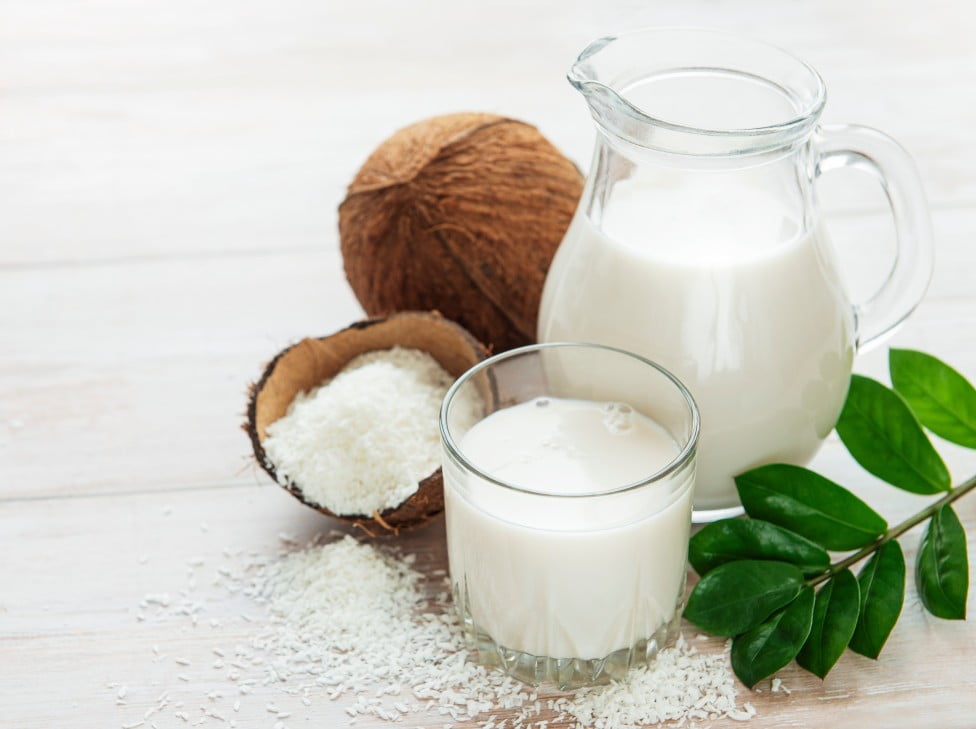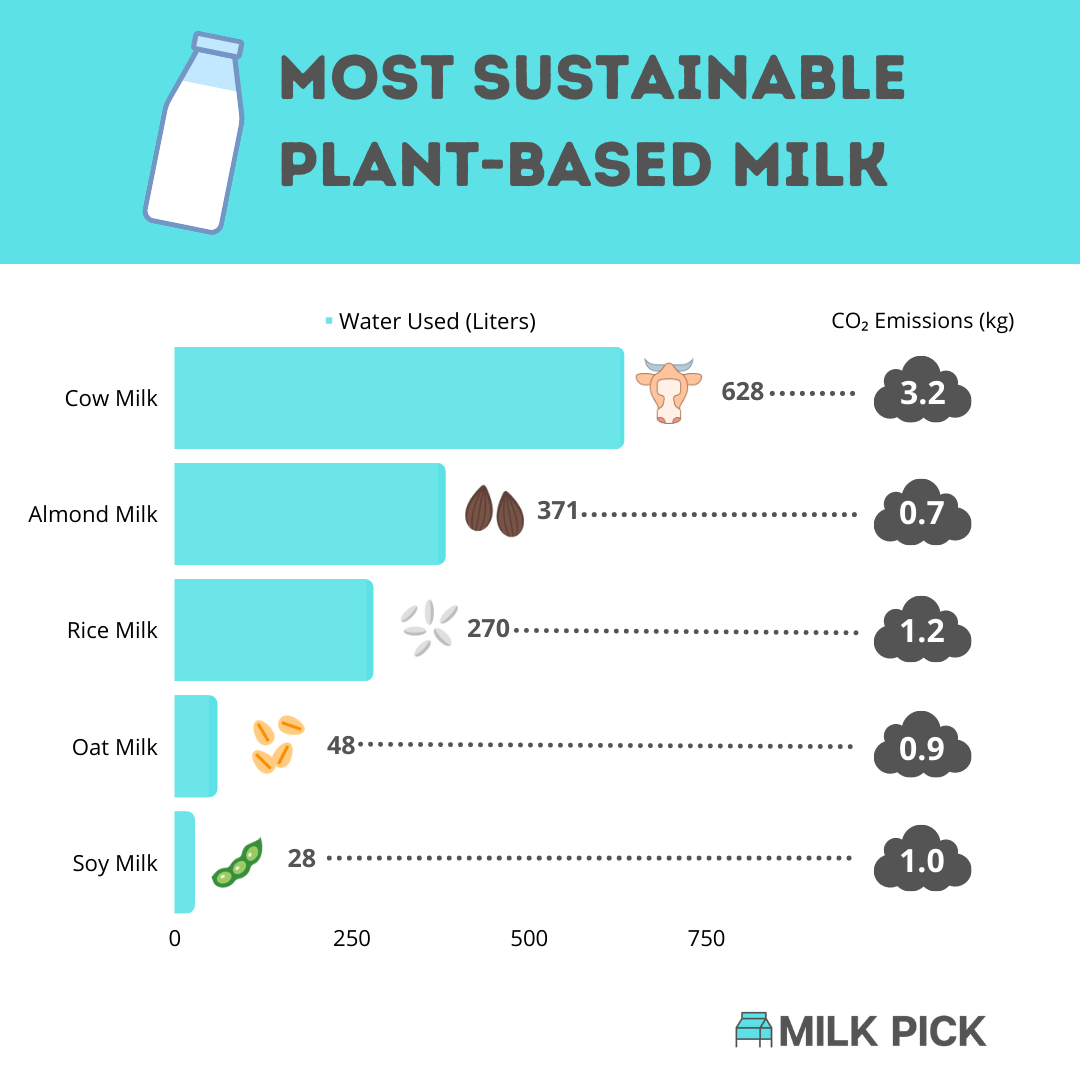Almond Milk vs. Coconut Milk
Almond milk is a low calorie non-dairy milk option that people love. But coconut milk is a sweeter alternative with its own benefits. Which is the healthier option?
Almond milk is a low calorie non-dairy milk option that people love. But coconut milk is a sweeter alternative with its own benefits. Which is the healthier option?
In recent years, plant-based milks have entered the mainstream as more and more people decide to make the switch to plant-based diets.
Almond milk and coconut milk remain two of the most popular plant-based milks thanks to their rich and creamy textures, delicious flavors, and nutrient-packed profiles. But which of these two beverages is a better milk alternative?
Comparing the two products side-by-side, almond milk contains far more natural calcium and protein than coconut milk, as well as fewer calories and fats.
However, coconut milk is better for the environment and tastes sweeter than most commercial almond milks. Depending on your needs, both are excellent milk replacements and can be added to any healthy diet.
Let’s take a closer look at both coconut and almond milk to determine which is a better option for you. We’ll explore their nutritional contents, production processes, and overall flavor profiles. If you’re ready to make the switch to a plant-based diet, keep reading to learn which milk is right for you.
Almond milk is one of the oldest plant-based milks in recorded human history. The first written account of the beverage dates back to the early 1200s, in a recipe book titled Kitab al-Tabik (A Baghdad Cookery Book).
The original recipe instructs chefs to soak almonds in water before grinding them into a paste. The paste would then be diluted with water and strained to remove excess particles.
Today, the production process remains relatively the same. Here's a video that shows how to make almond milk at home.
Although most commercial almond milks contain other ingredients, such as stabilizers and emulsifiers, the idea remains the same—soak and puree almonds into a drinking form.
Almond milk is beloved around the world for its creamy texture, nutty sweet flavor, and refreshing qualities.

Learn more about almond milk in our Almond Milk 101 video below:
Despite the common misconception, coconut milk is not the liquid inside of a coconut. Instead, it’s made by grinding the meat of a coconut into a fine powder and then adding back the waters that naturally exist inside the nut.
This creates a thick and creamy beverage that’s redolent of coconut.
Coconut milk has long been a staple of Southeast Asian and Austronesian diets and can still be found in many common dishes such as:
Thai and Goan curries
Coconut rice
Mango coconut pudding
Coconut ice cream
When it's not being added to recipes, it’s also drunk chilled or over ice as a delicious milk alternative.
Both plant-based milk alternatives are packed full of essential minerals and nutrients but, when compared side-by-side, they contain vastly different nutritional profiles.
Let’s take a closer look at their main nutrients and clarify which is healthier.
1 Cup | Almond Milk | Coconut Milk |
|---|---|---|
Calories | 39 | 552 |
Protein | 1g | 6g |
Fat | 3g | 57.1g |
Carbohydrates | 4g | 13.3g |
Fiber | 1g | 5g |
Sugar | 2g | 8g |
Data sources: Almond milk, Coconut milk, Disclaimer about this information
Cow’s milk is an excellent source of protein with roughly 8 grams in every 1 cup serving.
When people cut out milk, they often do so to embrace a completely plant-based diet but then struggle to meet their daily protein requirements.
Fortunately, many plant-based milks offer similarly high amounts of protein.
The bad news, though, is that almond milk doesn't fall into this category.
An 8 oz serving of almond milk contains just 1 gram of protein, while a similar serving of coconut milk contains 6 grams.
However, the higher protein count comes with a hefty serving of fat, and most people don't consume an entire cup of coconut milk in one serving.
Maybe it’s just good marketing but everyone knows that drinking milk helps build strong bones.
Dairy is an excellent source of calcium and, without it, you may struggle to consume enough calcium to build and maintain healthy teeth and bones.
That doesn’t mean you’re out of luck, though. Many plants also contain naturally high volumes of calcium.
A 1-cup serving of commercial almond milk contains around 482 milligrams of calcium, which is more than whole milk.
We should point out, though, that most commercial almond milks are fortified with added calcium so don’t expect the same volumes if you make your own.
Coconut milk, on the other hand, is rarely fortified with additional minerals. A 1 cup serving of coconut milk typically contains just 38 milligrams of calcium.
This makes it less than ideal as a milk replacement, considering it’s short on both protein and calcium.
Dairy producers sell milk in a range of fat contents but, in its natural form, milk is a rich source of saturated and unsaturated fat.
For health reasons, though, most people try to avoid consuming large quantities of saturated fat. In theory, plant-based milks should make wonderful alternatives, but, unfortunately, this isn’t always the case.
Coconut milk is actually fattier than cow’s milk. A single 1 cup serving of coconut milk contains around 57 grams of fat, nearly half of which is saturated.
This is in contrast to the 8 grams of fat in 1 cup of cow’s milk.
For this reason, coconut milk is incredibly caloric and likely a bad choice for everyday consumption.
Almond milk, on the other hand, is lean and heart-healthy.
One cup of the beverage contains just 3 grams of fat, none of which is saturated. This makes it an excellent choice for your breakfast cereal, coffee, or even in recipes.

Even if you’ve switched to plant-based milks for health reasons, that doesn’t mean you can’t enjoy what you’re drinking.
Many non-dairy alternatives are packed full of flavor and almond and coconut milk are no exception. Yet, the two alternatives are vastly different and should be used in different ways.
Almond milk has a nutty, mildly sweet flavor that ranges from toasty to watery. Many commercial brands add sugar and other sweeteners to amplify its natural flavor but, for the most part, it has a subtle and pleasant taste.
As for its consistency, almond milk is often thinner than whole milk but creamier than 1% or fat-free milk. You can use it in your cereal or drink it like it’s normal milk.
Coconut milk, on the other hand, is naturally rich and has a distinctly tropical flavor. At its worst, it can taste soapy but, at its best, it can taste incredibly sweet.
Thanks to this quality, it’s often added to desserts, such as cakes, puddings, and creams.
Coconut milk’s naturally high fat content makes it very thick and creamy, sometimes as thick as whipped cream.
Aside from health reasons, many people are turning to plant-based diets to help the environment.
The dairy and cattle industries alone account for roughly 37% of all methane emissions in the United States. So, by reducing their reliance on cows and other ruminants, many people hope to lower their carbon footprints.
Plant-based milks may seem like an ideal way to circumvent these effects but you’d be surprised to learn that not all plant industries are as beneficent as they appear.
According to findings from UC San Francisco, the almond industry currently consumes unsustainable amounts of water and relies heavily on pesticides to produce a crop.
To produce a single half-gallon carton of almond milk, manufacturers use up to 248 gallons of water to grow and maintain their trees.

While this may seem like a fair trade-off for clean air and lower carbon emissions, keep in mind that 80% of the world’s almonds are grown in California, which regularly faces drought conditions.
Coconuts, on the other hand, are far less detrimental.
A coconut tree uses less water than an almond tree or cow, and can also absorb carbon dioxide from the atmosphere.
The only downside is that coconut trees produce fewer nuts per tree than an almond tree. However, a single coconut can produce around 2 cups of milk.
If you’re dedicated to improving the environment, we recommend switching to sustainable plant-based milks such as soy, oat, or pea milk.
After comparing both dairy alternatives, we recommend almond milk for a daily milk replacement.
It’s generally healthier than coconut milk and can be used in a wider variety of ways. It may not be as creamy or sweet as coconut milk but you’ll be able to drink it every day without worrying about your waistline or heart.
Our only complaint about almond milk is that it’s widely considered the most environmentally harmful plant-based milk.
Although the almond industry produces very little greenhouse gas, it consumes unsustainable amounts of water and contributes to ongoing drought conditions in California. If you’re looking for a sustainable dairy alternative, almond milk might not be the best option.

Coconut and almond milk are both popular and delicious plant-based milk alternatives. They’re beloved around the world for their creamy textures, sweet flavors, and nutritional contents but, after assessing both, we found that almond milk is generally healthier than coconut.
If you’re considering switching to a plant-based diet or simply cannot consume dairy, don’t be afraid to test out both options and make your own choice. Just go easy on the coconut milk because it is quite calorically dense and rich in saturated fats.